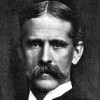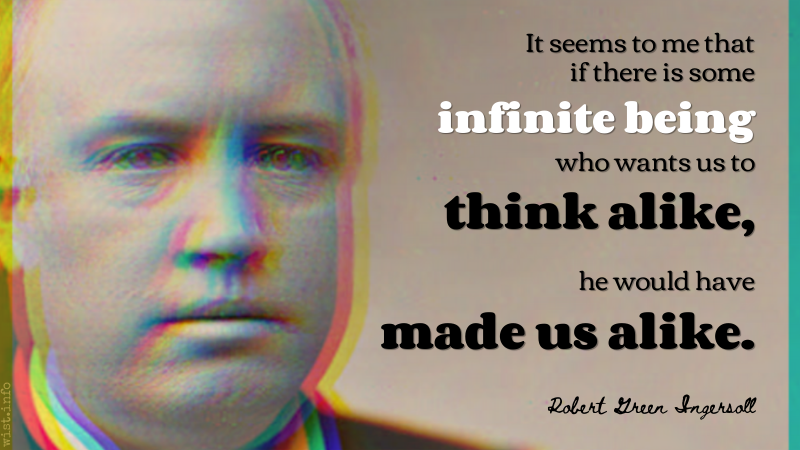When I think of antiquity, the detail that frightens me is that those hundreds of millions of slaves on whose backs civilization rested generation after generation have left behind them no record whatever. We do not even know their names. In the whole of Greek and Roman history, how many slaves’ names are known to you? I can think of two, or possibly three. One is Spartacus and the other is Epictetus. Also, in the Roman room at the British Museum there is a glass jar with the maker’s name inscribed on the bottom, “Felix fecit.” I have a vivid mental picture of poor Felix (a Gaul with red hair and a metal collar round his neck), but in fact he may not have been a slave; so there are only two slaves whose names I definitely know, and probably few people can remember more. The rest have gone down into utter silence.
George Orwell (1903-1950) English journalist, essayist, writer [pseud. of Eric Arthur Blair]
Essay (1942-08), “Looking Back on the Spanish War, ch. 4, Such, Such Were the Joys, essay 8 (1953)
(Source)
Quotations about:
identity
Note not all quotations have been tagged, so Search may find additional quotes on this topic.
“Hallo, Rabbit,” he said, “is that you?”
“Let’s pretend it isn’t,” said Rabbit, “and see what happens.”A. A. Milne (1882-1956) English poet and playwright [Alan Alexander Milne]
Winnie-the-Pooh, ch. 8 “Christopher Robin Leads an Expotition” (1926)
(Source)
Writing sustains me. But wouldn’t it be more accurate to say that it sustains this kind of life? Which does not, of course, mean that my life is any better when I don’t write. On the contrary, at such times it is far worse, wholly unbearable, and inevitably ends in madness. This, of course only on the assumption that I am a writer even when I don’t write — which is indeed the case; and a non-writing writer is, in fact, a monster courting insanity.
JANE: Oh, I know about pretending. I once went on holiday and pretended to be twins. It was amazing fun. I invented this mad, glamorous sister and went around really annoying everybody. And d’you know, I could get away with anything when I was my crazy twin Jane.
SALLY: But you’re Jane.
JANE: Kinda stuck. It’s a long story.
Steven Moffat (b. 1961) Scottish television writer, producer
Coupling, 02×09 “The End of the Line” (2001-10-29)
(Source)
(Source (Video) at 3:31; dialog verified)
What does your conscience say? You should become who you are.
[Was sagt dein Gewissen? — „Du sollst der werden, der du bist.”]Friedrich Nietzsche (1844-1900) German philosopher and poet
The Gay Science [Die fröhliche Wissenschaft], Book 3, § 270 (1882) [tr. Nauckhoff (2001)]
(Source)
Also known as La Gaya Scienza, The Joyful Wisdom, or The Joyous Science.
(Source (German)). Alternate translations:What Saith thy Conscience? -- "Thou shalt become what thou art."
[tr. Common (1911)]What does your conscience say? -- "You shall become the person you are."
[tr. Kaufmann (1974)]What does your conscience say? "You shall become who you are."
[tr. Hill (2018)]
I like to sit and have a talk sometimes with that odd little chap that was myself long ago. I think he likes it too, for he comes so often of an evening when I am alone with my pipe, listening to the whispering of the flames. I see his solemn little face looking at me through the scented smoke as it floats upward, and I smile at him; and he smiles back at me, but his is such a grave, old-fashioned smile. We chat about old times; and now and then he takes me by the hand, and then we slip through the black bars of the grate and down the dusky glowing caves to the land that lies behind the firelight. There we find the days that used to be, and we wander along them together. He tells me as we walk all he thinks and feels. I laugh at him now and then, but the next moment I wish I had not, for he looks so grave I am ashamed of being frivolous. Besides, it is not showing proper respect to one so much older than myself — to one who was myself so very long before I became myself.
Jerome K. Jerome (1859-1927) English writer, humorist [Jerome Klapka Jerome]
Idle Thoughts of an Idle Fellow, “On Memory” (1886)
(Source)
First published in Home Chimes (1885-09-26).
The search for a personal identity is the life task of a teenager.
Haim Ginott (1922-1973) Israeli-American school teacher, child psychologist, psychotherapist [b. Haim Ginzburg]
Between Parent and Teenager, ch. 2 “Rebellion and Response” (1969)
(Source)
Nationality is a Janus, facing both ways. So far as it stands for the right of a people to govern itself, it stands for freedom. So far as it stands for the ambition to govern other people, or to destroy them, or to shape them into an alien world, it stands for domination. Throughout history it has stood for both.
G. Lowes Dickinson (1862-1932) British political scientist and philosopher [Goldsworthy "Goldie" Lowes Dickinson]
“The War and the Way Out: A Further Consideration,” sec. 3, Atlantic Monthly (1915-04)
(Source)
Language both reflects and shapes society. Culture shapes language and then language shapes culture. Little wonder that the words we use to talk to each other, and about each other, are the most important words in our language: they tell us who I am, they tell us who you are, they tell us who “they” are.
Rosalie Maggio (1944-2021) American writer
Unspinning the Spin: The Women’s Media Center Guide to Fair and Accurate Language, “Writing Guidelines / Introduction” (2014)
(Source)
The first sentence (and much of the groundwork for the overall work) is included in her The Bias-Free Word Finder: A Dictionary of Non-Discriminatory Language, Introduction (1992).
The source link is to the web page that the WMC set up for the book.
Somewhere — in desolate wind-swept space —
In Twilight-land — in No-man’s land —
Two hurrying Shapes met face to face,
And bade each other stand.
“And who are you?” cried one a-gape,
Shuddering in the gloaming light.
“I know not,” said the second Shape,
“I only died last night!”Thomas Bailey Aldrich (1836-1907) American writer, poet, critic, editor
“Identity,” Poems, Part 2 “Interludes” (1885)
(Source)
HOLT: Every time someone steps up and says who they are, the world becomes a better, more interesting place.
Carly Hallam (b. 1987) America screenwriter, producer, actor
Brooklyn Nine-Nine, 5×10 “Game Night” (2017-12-12) [with Justin Noble]
(Source)
On Diaz coming out as bisexual.
Respect the ancient stock, nor make
The Latian tribes their style forsake,
Nor Troy’s nor Teucer’s surname take,
Nor garb nor language let them change
For foreign speech and vesture strange,
But still abide the same:
Let Latium prosper as she will,
Their thrones let Alban monarchs fill;
Let Rome be glorious on the earth,
The centre of Italian worth;
But fallen Troy be fallen still,
The nation and the name.[Ne vetus indigenas nomen mutare Latinos
neu Troas fieri iubeas Teucrosque vocari
aut vocem mutare viros aut vertere vestem.
Sit Latium, sint Albani per saecula reges,
sit Romana potens Itala virtute propago:
occidit, occideritque sinas cum nomine Troia.]Virgil (70-19 BC) Roman poet [b. Publius Vergilius Maro; also Vergil]
The Aeneid [Ænē̆is], Book 12, l. 823ff (12.823-828) [Juno] (29-19 BC) [tr. Conington (1866)]
(Source)
Juno agreeing to Jove to let the Trojans win the war for Italy, but only if they become assimilated into the nations they warred against, losing their culture and identity.
(Source (Latin)). Alternate translations:Let not the Latins change their ancient name,
Nor let them be call'd Trojans I beseech,
Nor yet to change their habit, nor their speech;
Let it be Latium, and for ever be
The Alban fathers in great Italie;
Let Romans by their valour conquer all.
Troy's slain: and with her let the name now fall.
[tr. Ogilby (1649)]But let the Latins still retain their name,
Speak the same language which they spoke before,
Wear the same habits which their grandsires wore.
Call them not Trojans: perish the renown
And name of Troy, with that detested town.
Latium be Latium still; let Alba reign
And Rome's immortal majesty remain.
[tr. Dryden (1697)]You will not command the natives of Latium to change their ancient name, or become Trojans, and be called Teucri, or to change their language or alter their dress. Let Latium subsist; let the kings of Alba subsist through the ages; let the sons of Rome rise to imperial power by means of Italian valour: Troy hath perished, and suffer it to perish with its name forever.
[tr. Davidson/Buckley (1854)]Bid not the Latins change their ancient name;
Trojans and Teucri let them not be called,
Nor change their speech or garb. Be it Latium still.
Let Alban monarchs through the centuries reign;
Let Rome's posterity attain their might
Through virtue of Italia. Troy hath fallen.
Then let it fall forever with its name.
[tr. Cranch (1872), l. 1044ff]Bid thou not the native Latins change their name of old, nor become Trojans and take the Teucrian name, or change their language, or alter their attire: let Latium be, let Alban kings endure through ages, let Italian valour be potent in the race of Rome. Troy is fallen; let her and her name lie where they fell.
[tr. Mackail (1885)]Let them not change their ancient name, those earth-born Latin men,
Nor turn them into Trojan folk, or call them Teucrians then:
Let not that manfolk shift their tongue, or cast their garb aside;
Let Latium and the Alban kings through many an age abide,
And cherish thou the Roman stem with worth of Italy:
Troy-town is dead: Troy and its name for ever let them die!
[tr. Morris (1900)]Ne'er let the children of the soil disown
The name of Latins; turn them not, I pray,
To Trojan folk, to be as Teucrians known.
Ne'er let Italia's children put away
The garb they wear, the language of to-day
Let Latium flourish, and abide the same,
And Alban kings through distant ages sway.
Let Rome through Latin prowess wax in fame;
But fall'n is Troy, and fall'n for ever be her name.
[tr. Taylor (1907), st. 108, l. 955ff]Let not the Latins lose
their ancient, native name. Bid them not pass
for Trojans, nor be hailed as Teucer's sons;
no alien speech, no alien garb impose.
Let it be Latium ever; let the lords
of Alba unto distant ages reign;
let the strong, master blood of Rome receive
the manhood and the might of Italy.
Troy perished: let its name and glory die!
[tr. Williams (1910)]Command not the native Latins to change their ancient name, nor to become Trojans and be called Teucrians, nor to change their tongue and alter their attire: let Latium be, let Alban kings endure through ages, let be a Roman stock, strong in Italian valour: fallen is Troy, and fallen let her be, together with her name!
[tr. Fairclough (1918)]Do not command the Latins, native-born,
To change their language, to be known as Trojans,
To alter speech or garb; let them be Latium,
Let Alban kings endure through all the ages,
Let Roman stock, strong in Italian valor,
Prevail: since Troy has fallen, let her name
Perish and be forgotten.
[tr. Humphries (1951)]Do not command the indigenous Latins to change their ancient
Name, to beocme Trojans and to be called the Teucrians:
Allow them to keep the old language and their traditional dress:
Let it be Latium for ever, and the kings be Alban kings;
Let the line be Roman, the qualities making it great be Italian.
Troy's gone; may it be gone in name as well as reality.
[tr. Day-Lewis (1952)]Do not let the native-
born Latins lose their ancient name, become
Trojans, or be called Teucrians; do not
make such men change their language or their dress.
Let Latium still be, let Alban kings
still rule for ages; let the sons of Rome
be powerful in their Italian courage.
Troy now is fallen; let her name fall, too.
[tr. Mandelbaum (1971), l. 1093ff]Never command the land's own Latin folk
To change their old name, to become new Trojans,
Known as Teucrians; never make them alter
Dialect or dress. Let Latium be.
Let there be Alban kings for generations,
And let Italian valor be the strength
Of Rome in after times. Once and for all
Troy fell, and with her name let her like fallen.
[tr. Fitzgerald (1981), l. 1116ff]Do not command the Latins to change their ancient name in their own land, to become Trojans and be called Teucrians. They are men. Do not make them change their voice or native dress. Let there be Latium. Let the Alban kings live on from generation to generation and the stock of Rome be made mighty by the manly courage of Italy. Troy has fallen. Let it lie, Troy and the name of Troy.
[tr. West (1990)]Don’t order the native Latins to change their ancient name,
to become Trojans or be called Teucrians,
or change their language, or alter their clothing.
Let Latium still exist, let there be Alban kings through the ages,
let there be Roman offspring strong in Italian virtue:
Troy has fallen, let her stay fallen, along with her name.
[tr. Kline (2002)]Never command the Latins, here on native soil,
to exchange their age-old name,
to become Trojans, called the kin of Teucer,
alter their language, change their style of dress.
Let Latium endure. Let Alban kings hold sway for all time.
Let Roman stock grow strong with Italian strength.
Troy has fallen -- and fallen let her stay --
with the very name of Troy!
[tr. Fagles (2006), l. 954ff]Do not allow the Latins to change their ancient name
either in becoming Trojans or being called Teucrians.
Don’t let them change their language or their clothing,
may it be Latium, may there be Alban kings for generations;
may the Roman race be strong through Italian power.
It fell: let Troy perish with its name.
[tr. @sentantiq (2015)]
No matter what a man or a woman does for a living, it is part of the human mechanism to expect and need recognition of some sort. Beyond the security and the paycheck is the palpable hunger of a person to have an identity of his own.
Rod Serling (1924-1975) American screenwriter, playwright, television producer, narrator
Patterns, Introduction (1957)
(Source)
What happens when conspiracy theories become the coin of politics, and mainstream media and educational institutions are discredited, is that citizens no longer have a common reality that can serve as background for democratic deliberation. In such a situation, citizens have no choice but to look for markers to follow other than truth or reliability. What happens in such cases, as we see across the world, is that citizens look to politics for tribal identifications, for addressing personal grievances, and for entertainment. When news becomes sports, the strongman achieves a certain measure of popularity. Fascist politics transforms the news from a conduit of information and reasoned debate into a spectacle with the strongman as the star.
Jason Stanley (b. 1969) American philosopher, epistemologist, academic
How Fascism Works: The Politics of Us and Them, ch. 4 (2018)
(Source)
In an age where there is much talk about “being yourself” I reserve to myself the right to forget about being myself, since in any case there is very little chance of my being anybody else. Rather it seems to me that when one is too intent on “being himself” he runs the risk of impersonating a shadow.
Thomas Merton (1915-1968) French-American religious and writer [a.k.a. Fr. M. Louis]
“Day of a Stranger,” The Hudson Review (Summer 1967)
(Source)
For ages past, women were defined only in relation to other people, and the definition lingers: a woman may be called a wife and mother for most of her life, while a man is called a husband and father only at his funeral.
Barbara Holland (1933-2010) American author
One’s Company: Reflections on Living Alone, ch. 1 (1992)
(Source)
What we do belongs to what we are; and what we are is what becomes of us.
It seems to me that if there is some infinite being who wants us to think alike, he would have made us alike.
Robert Green Ingersoll (1833-1899) American lawyer, freethinker, orator
Speech to the Jury, Trial of C. B. Reynolds for Blasphemy, Morristown, New Jersey (May 1887)
(Source)
When asked to define a friend, he said, “One soul dwelling in two bodies.”
[ἐρωτηθεὶς τί ἐστι φίλος, ἔφη, “μία ψυχὴ δύο σώμασιν ἐνοικοῦσα.”]
Aristotle (384-322 BC) Greek philosopher
Attributed in Diogenes Laërtius, Lives and Opinions of Eminent Philosophers [Vitae Philosophorum], Book 5, sec. 11 [tr. Mensch (2018)]
(Source)
(Source (Greek)). Alternate translations:He was once asked what a friend is; and his answer was, “One soul abiding in two bodies.”
[tr. Yonge (1853)]To the query, "What is a friend?" his reply was, "A single soul dwelling in two bodies."
[tr. Hicks (1925), sec. 20]When he was asked what a friend is, he replied “one soul occupying two bodies.”
[tr. @sentantiq (2016)]
Pity is aroused by unmerited misfortune, fear by the misfortune of a man like ourselves.
[ἔλεος μὲν περὶ τὸν ἀνάξιον, φόβος δὲ περὶ τὸν ὅμοιον]
Aristotle (384-322 BC) Greek philosopher
Poetics [Περὶ ποιητικῆς, De Poetica], ch. 13 / 1453a (c. 335 BC) [tr. Butcher (1895)]
(Source)
On the essential elements of tragedy. Original Greek. Alternate translations:
- "Pity is occasioned by undeserved misfortune, and fear by that of one like ourselves." [tr. Bywater (1909)]
- "Pity is concerned with unmerited ill-fortune, fear with what happens to one's like." [tr. Margoliouth (1911)]
- "Pity for the undeserved misfortune, fear for the man like ourselves." [tr. Fyfe (1932)]
- "We pity those who suffer undeservedly, and feel fear for people who are like ourselves." [tr. Janko (1987)]
- "The one [pity] is to do with the man brought to disaster undeservedly, the other [terror] is to do with [what happens to] men like us." [tr. Whalley (1997)]
- "One of these sentiments, namely pity, has to do with undeserved misfortune, and the other, namely fear, has to do with someone who is like ourselves." [tr. Sachs (2006)]
To people who feel deprived of a clear social identity, Ur-Fascism says that their only privilege is the most common one, to be born in the same country. This is the origin of nationalism.
Umberto Eco (1932-2016) Italian semiotician, essayist, philosopher, novelist
“Ur-Fascism,” New York Review of Books (22 Jun 1995)
(Source)
Young people, who are still uncertain of their identity, often try on a succession of masks in the hope of finding the one which suits them — the one, in fact, which is not a mask.
W. H. Auden (1907-1973) Anglo-American poet [Wystan Hugh Auden]
“One of the Family” (1965), Forewords and Afterwords (1973)
(Source)
My person was hideous and my stature gigantic. What did this mean? Who was I? What was I? Whence did I come? What was my destination? These questions continually recurred, but I was unable to solve them.
Mary Wollstonecraft Shelley (1797-1851) English novelist
Frankenstein, ch. 14 (1818)
(Source)
Narrated by the Monster.
The concentration camps, by making death itself anonymous (making it impossible to find out whether a prisoner is dead or alive), robbed death of its meaning as the end of a fulfilled life. In a sense they took away the individual’s own death, proving that henceforth nothing belonged to him and he belonged to no one. His death merely set a seal on the fact that he had never existed.
Hannah Arendt (1906-1975) German-American philosopher, political theorist
The Origins of Totalitarianism, Part 3, ch. 12 “Totalitarianism in Power,” sec. 3 (1951)
(Source)
The disturbing factor in the success of totalitarianism is rather the true selflessness of its adherents: it may be understandable that a Nazi or Bolshevik will not be shaken in his conviction by crimes against people who do not belong to the movement or are even hostile to it; but the amazing fact is that neither is he likely to waver when the monster begins to devour its own children, and not even if he becomes a victim of persecution himself, if he is framed and condemned, if he is purged from the party and sent to a forced-labor or concentration camp. On the contrary, to the wonder of the whole civilized world, he may even be willing to help in his own prosecution and frame his own death sentence if only his status as a member of the movement is not touched.
Hannah Arendt (1906-1975) German-American philosopher, political theorist
The Origins of Totalitarianism, Part 3, ch. 10 “A Classless Society,” sec. 1 (1951)
(Source)
You can never leave home. You take it with you no matter where you go. Home is between your teeth, under your fingernails, in the hair follicles, in your smile, in the ride of your hips, in the passage of your breasts.
Maya Angelou (1928-2014) American poet, memoirist, activist [b. Marguerite Ann Johnson]
“The Art of Fiction,” Paris Review, #116, Interview with George Plimpton (1990)
(Source)
Characters never change. Opinions alter — characters are only developed.
Benjamin Disraeli (1804-1881) English politician and author
(Attributed)
Quoted in Joseph Waldo Denny, Wearing The Blue in The Twenty-Fifth Mass. Volunteer Infantry (1879).
More to the point, nameless hideous monsters are freaking terrifying. You always fear what you don’t know, what you don’t understand, and the first step to having understanding of something is to know what to call it. It’s a habit of mine to give names to anything I wind up interacting with if it doesn’t have one readily available. Names have power — magically, sure, but far more important, they have psychological power. Something horrible with a name holds less power over you, less terror, than something horrible without one.
“Octokongs,” I pronounced grimly. “Why did it have to be octokongs?”
I am persuaded that the people of the world have no grievances, one against the other. The hopes and desires of a man who tills the soil are about the same whether he lives on the banks of the Colorado or on the banks of the Danube.
Lyndon B. Johnson (1908-1973) American politician, educator, US President (1963-69)
Speech (1947-05-07), House of Representatives
(Source)
As part of an argument that the increasing tension between the Soviet Union and the US was over ideology and government actions, not between peoples.
Money? He will say: “Take my money, since you can, and it is so desirable to you; take it, — and take yourself away with it; and leave me alone to my work here. I am still here; can still work, after all the money you have taken from me!” But if they come to him, and say, “Acknowledge a Lie; pretend to say you are worshipping God, when you are not doing it: believe not the thing that you find true, but the thing that I find, or pretend to find true!” He will answer: “No; by God’s help, no! You may take my purse; but I cannot have my moral Self annihilated. The purse is any Highwayman’s who might meet me with a loaded pistol: but the Self is mine and God my Maker’s; it is not yours; and I will resist you to the death, and revolt against you, and, on the whole, front all manner of extremities, accusations and confusions, in defence of that!”
Thomas Carlyle (1795-1881) Scottish essayist and historian
Lecture (1840-05-22), “The Hero as King,” Home House, Portman Square, London
(Source)
The lecture notes were collected by Carlyle into On Heroes, Hero-Worship, & the Heroic in History, Lecture 6 (1841).
I come from under the hill, and under the hills and over the hills my paths led. And through the air. I am he that walks unseen. […] I am the clue-finder, the web-cutter, the stinging fly. I was chosen for the lucky number. […] I am he that buries his friends alive and drowns them and draws them alive again from the water. I came from the end of a bag, but no bag went over me. […] I am the friend of bears and the guest of eagles. I am Ring-winner and Luckwearer; and I am Barrel-rider.
J.R.R. Tolkien (1892-1973) English writer, fabulist, philologist, academic [John Ronald Reuel Tolkien]
The Hobbit, ch. 12 “Inside Information” [Bilbo] (1937)
(Source)
Bilbo's "riddling talk" epithets, given to Smaug in "the way to talk to dragons, if you don't want to reveal your proper name (which is wise), and don't want to infuriate them by a flat refusal (which is also very wise)."
When people come to see us, we foolishly prattle, lest we be inhospitable. But things said for conversation are chalk eggs. Don’t say things. What you are stands over you the while, and thunders so that I cannot hear what you say to the contrary.
Ralph Waldo Emerson (1803-1882) American essayist, lecturer, poet
“Social Aims,” lecture, Boston (1864-12-04), Letters and Social Aims (1875)
(Source)
Likely source of the abridgments more commonly found *in:More discussion of this quotation: What You Do Speaks So Loudly that I Cannot Hear What You Say – Quote Investigator
- "What you do speaks so loudly that I cannot hear what you say."
- "What you are speaks so loudly that I cannot hear what you say."
- "Who you are speaks so loudly that I cannot hear what you say."
- "What we are speaks louder than what we say." [John F Kennedy, Q&A, Salt Lake City (23 Sep 1960), and in numerous subsequent speeches]
No man, for any considerable period, can wear one face to himself, and another to the multitude, without finally getting bewildered as to which may be the true.
Nathaniel Hawthorne (1804-1864) American writer
The Scarlet Letter, ch. 20 “The Minister in a Maze” (1850)
(Source)
See La Rochefoucauld.
Candy smiled at me a little. “Look,” she said. “You’re a good guy. I know you care about me, but you’re a white male, you can’t understand a minority situation. It’s not your fault.”
[…] When the beer came, I drank about a quarter of it and said to Candy, “Extend that logic, and we eventually have to decide that no one can understand anyone. Maybe the matter of understanding has been overrated. Maybe I don’t have to understand your situation to sympathize with it, to help you alter it, to be on your side. I’ve never experienced starvation either, but I’m opposed to it. When I encounter it, I try to alleviate it. I sympathize with its victims. The question of whether I understand it doesn’t arise.”
She shook her head. “That’s different,” she said.
“Maybe it isn’t. Maybe civilization is possible, if at all, only because people can care about conditions they haven’t experienced. Maybe you need understanding like a fish needs a bicycle.”
“You’re quite thoughtful,” she said, “for a man your size.”
“You’ve never been my size,” I said. “You wouldn’t understand.”
OPHELIA: Lord, we know what we are but know not what we may be.
William Shakespeare (1564-1616) English dramatist and poet
Hamlet, Act 4, sc. 5, l. 48ff (4.5.48-49) (c. 1600)
(Source)
It is a great piece of folly to sacrifice the inner for the outer man, to give the whole or the greater part of one’s quiet, leisure, and independence for splendor, rank, pomp, titles and honor.
[Es ist eine große Thorheit, um nach Außen zu gewinnen, nach Innen zu verlieren, d. h. für Glanz, Rang, Prunk, Titel und Ehre, seine Ruhe, Muße und Unabhängingkeit ganz oder großen Theils hinzurgeben.]
Arthur Schopenhauer (1788-1860) German philosopher
Parerga and Paralipomena, Vol. 1, “Aphorisms on the Wisdom of Life [Aphorismen zur Lebensweisheit],” ch. 2 “Personality, or What Man Is [Von dem, was einer ist]” (1851) [tr. Saunders (1890)]
(Source)
(Source (German)). Alternate translation:It is a great folly to lose the inner man in order to gain the outer, that is, to give up the whole or the greater part of one's quiet, leisure, and independence for splendor, rank, pomp, titles and honors.
[tr. Payne (1974)]












































